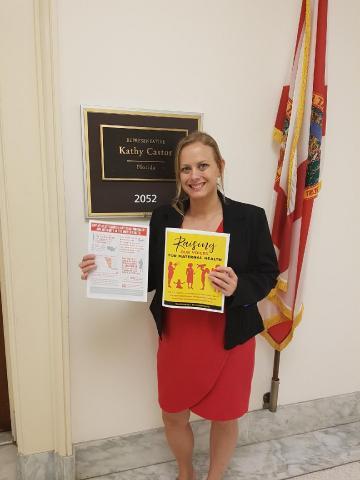
MomsRising Senior Campaign Director, Felicia, hand delivers petitions signed by MomsRising members, to Congress
We must fix this! Women don’t have to die from childbirth
A bipartisan piece of legislation, the Preventing Maternal Deaths Act of 2017, H.R.1318 in the House, and the Maternal Health Accountability Act of 2017, S.1112 in the Senate were introduced in March 2017 to address our nation's maternal mortality and morbidity crisis.
Currently, the United States holds the worst record for maternal and infant mortality in the developed world, and maternal mortality continues to rise. Every year in the U.S., 700 to 900 women die from pregnancy or childbirth-related causes, and some 65,000 nearly die.
American women are more likely to die from pregnancy-related complications than women in 45 other countries including the United Kingdom and much poorer nations like Libya and Kazakhstan. Additionally, the data reveal major racial disparities in maternal mortality rates: Black women are three to four times more likely to die from pregnancy complications than white women, independent of age, parity, or education in our nation.
This legislation would establish a program to help states review maternal deaths; establish and sustain a maternal mortality review committee; develop a plan for health care provider education to improve maternal care, and improve information collection on maternal deaths to provide public disclosure of information on maternal mortality. It will help enable health systems to address the factors leading to the disproportionate deaths of Black mothers and put recommendations in place to begin addressing racial disparities that have been present and unchanged for decades.
These are some of the critical solutions needed to address our nation’s maternal mortality and morbidity crisis.
We can fix this; women don’t have to die from childbirth. According to a recent analysis by the CDC Foundation, nearly 60 percent of maternal deaths in the U.S. are preventable. Sixty-percent. If we are able to decrease that number by even a fraction, thousands of mothers’ lives could be saved.
Here at Momsrising, you, our members, submitted hundreds of birth stories to our Maternal Health Resource Book, where MomsRising members from almost every state raised their voices to be heard on the need for improved maternal health outcomes for themselves and their loved ones. The stories generously submitted to this book have been shared with Members of Congress, state elected officials and other decisionmakers to share the lived experiences and impacts behind the statistics. Though statistics matter, it's YOUR stories that move hearts and minds to make a difference.
And this HAS all made a difference! On June 28, 2018, the Senate Health, Education, Labor, and Pensions (HELP) Committee passed the Maternal Health Accountability Act (S1112). Though this was a victory, the next step was to take action and urge the House of Representatives to pass the House bill, the Preventing Maternal Deaths Act, out of the Energy and Commerce committee.
In July, MomsRising delivered over 19,000 of our members' signatures to the House of Representatives in support of Preventing Maternal Deaths Act of 2017.
Now, the Subcommittee on Health in the Energy and Commerce Committee will hold a hearing on this bill. MomsRising has submitted testimony highlighting the stories of our members to urge the committee to vote yes on successfully passing this!
You can catch the live feed of the hearing this Friday, September 14, starting at 9:15 am ET. Click here to watch: https://energycommerce.house.gov.
Together we are a powerful voice for the health of moms, and we thank you for standing up for the rights and health of pregnant women!


The views and opinions expressed in this post are those of the author(s) and do not necessarily reflect those of MomsRising.org.
MomsRising.org strongly encourages our readers to post comments in response to blog posts. We value diversity of opinions and perspectives. Our goals for this space are to be educational, thought-provoking, and respectful. So we actively moderate comments and we reserve the right to edit or remove comments that undermine these goals. Thanks!